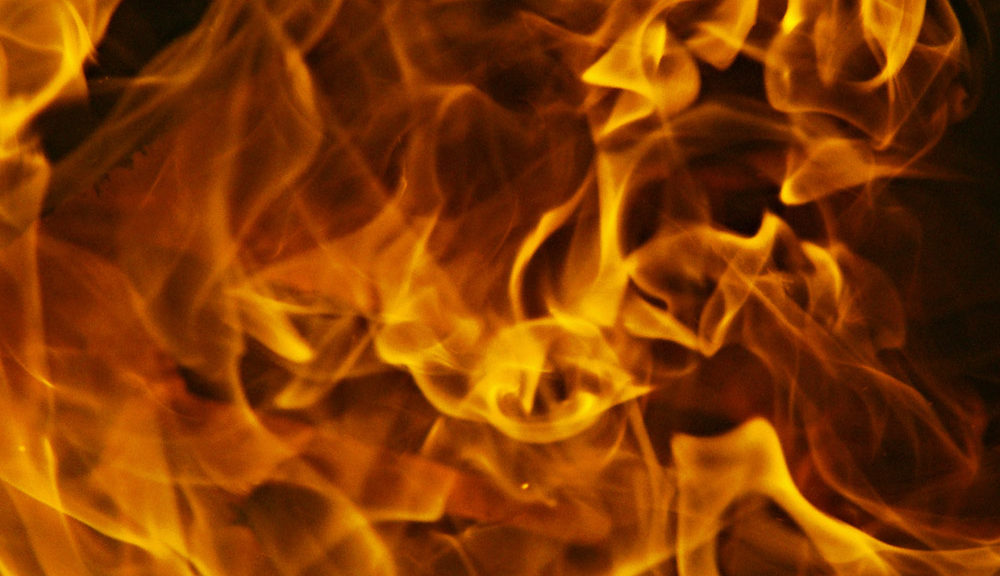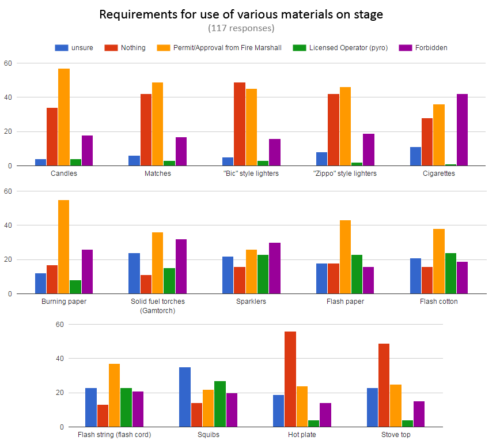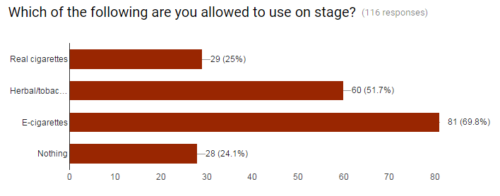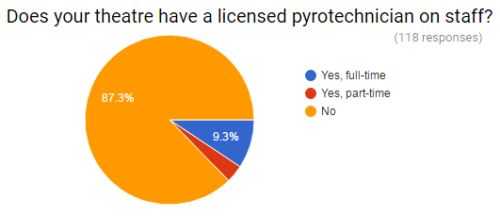I recently put out a survey to see how various theaters and other live venues deal with open flame and pyrotechnic effects.
I received a total of 118 responses. The chart below shows the breakdown by country.

Responses from outside the USA came from Canada, the UK, and Australia, as well as from Belgium, the Netherlands, and Finland.
The responses were from a healthy mix of companies, from the largest regional theaters to the smallest community theaters. There were responses from Broadway and off-Broadway houses, as well as theme parks, opera companies, and educational programs.
The meat of the survey was a series of questions asking about the requirements for using various items. The items included open flame devices like candles and matches, pyrotechnic devices like squibs and sparklers, and heating elements like stoves.
Every answer has at least some variety. Perhaps the closest ones with any sort of “consensus” were burning paper and a hot plate. But it goes to show just how different every venue could be. Â Even within the venues, the requirements could change on a show-to-show basis. A lot of what is “allowed” comes down to the fire marshal’s approval, and that can change depending on which fire marshal visits your theatre, or even how you present the effect to the fire marshal.
I also wanted to point out one interesting distinction between “Bic-style” and “Zippo-style” lighters. You can see in the chart above that a Zippo-style lighter is more likely to require a flame permit than a Bic-style lighter. Not all lighters are the same!
The use of cigarettes is not just dependent on the fire marshal; you also have to contend with tobacco and smoking regulations. I asked a question about what types of smoking products are allowed:
I was actually surprised at the percentage of theaters that could still use real cigarettes. From talking with other props masters, it sounded like they were all but completely banned by this point. But apparently a few places can still use them, usually citing free speech as their defense.
Looking at the individual responses, I found another surprise. In some venues, real and herbal cigarettes were allowed, while e-cigarettes were not. Usually, though, it is more likely to be the case that e-cigarettes were the only option where all others were banned.
The last graph shows whether theaters have a licensed pyrotechnician on staff.
Having someone on the theater’s payroll makes a big difference with what types of effects they use regularly. Using flash paper on stage gets a whole lot more expensive if you have to hire an additional crew member. If you ever wondered how some companies can afford to use a lot of pyro, this may be the answer.
The final question of the survey asked for additional comments on the use of flame and pyro effects. Many responses discussed the safety procedures they had to follow, such as maintaining a fire watch or flameproofing all the surrounding scenery. A few places mentioned they are only allowed to light and extinguish candles and matches on stage, not off.
A couple of responses reiterated just how arbitrary the rulings of a fire marshal can be. In one case, effects which followed national and state guidelines were banned simply because of city politics. Every theatre and every show is different, and you should never assume you can do certain effects just because you saw another theatre do them.








